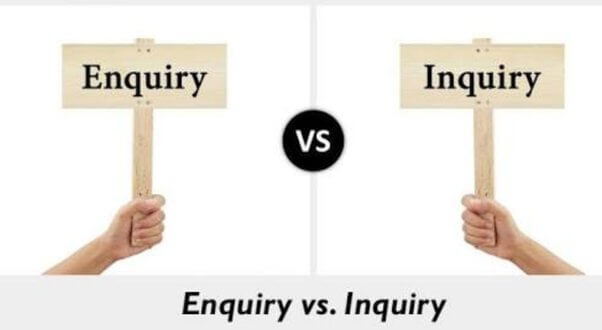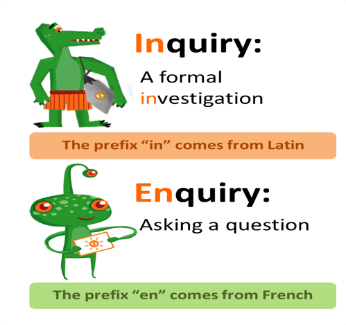Difference between Inquiry and EnquirySome English language learners become peculiar pronunciation patterns. Additionally, they struggle greatly with illogical and irregular linguistic norms. Then there are words with similar sounds but different definitions. 
The distinction between the two words has blurred in recent years, with both being used interchangeably, particularly in American English. In the United States, the word inquiry has surpassed enquiry. However, British English keeps the distinction between the words. According to Fowler's Modern English Usage, published in 1926, inquiry refers to a formal inquest, and enquiry refers to the act of questioning. Nonetheless, many dictionaries, including the Oxford English Dictionary, list inquiry and enquiry as synonyms. Inquiry refers to an investigation into something and has a more formal and official overtone, whereas enquiry refers to a request for truth, knowledge, or information and is more informal in use. Essentially, enquiry and request have the same application and meaning, both words intend to seek information about something or to conduct a formal investigation. The primary distinction is between how they are used in British and American English. Let's examine only one of these ambiguities in English usage knowing the distinction between the words enquiry and inquiry. We'll examine the key distinctions between these two terms and provide straightforward usage examples. Here are some examples of inquiry and enquiry in action:
The Latin verb quaere, which means "to ask or seek," is the same root as the English words inquire and enquiry. Inquire and enquiry isn't usually synonymous, despite having similar pronunciations, meanings, and origins. It all depends on where people reside and the type of information they need. Many terms in the English language have similar sounds but different spellings. These include "enquiry" and "inquiry," "programme" and "programme,". Understanding the distinction between inquiry and enquiry is crucial because these two words have nearly identical connotations in the English language. People frequently use these words interchangeably because they imply nearly identical concepts. But there are slight distinctions between the meanings, most of which have to do with the context in which the phrases are used. American English's influence
Regional influences can occasionally be found in the spelling of English words. For instance, many words in American English lack the "u" (for example, "color," "flavor," etc.) and use a "z" rather than an "s," (for example, "organize," "recognize," etc.) yet they still have the same meaning as "colour," "flavour," "organise," and "recognise." The work of dictionaries editor Noah Webster in the late 1700s contributed significantly to the development of American English spelling. To make numerous terms easier for people to spell, Webster advised simplifying them (for instance, using the word "jail" instead of "gaol"). In American English, the words "inquire" and "inquiry" is more prevalent than the verb "enquire" and the associated noun "enquiry." Although either spelling is acceptable in Australia, it is customary to use inquire and inquiry for a formal investigation and enquire and enquiry for the general sense of "ask." Both words come from the Latin inquirer, a version of which is based on the verb quaerere, which means to search, according to the Oxford English Dictionary. The origin is shared by numerous other contemporary English terms (e.g. acquire, require, conquer, quest, request, inquest, and question). Enquire: to ask a questionThe word inquire, which is mostly used in British English, means "to ask a casual query." It dates back to Middle English in the fourteenth century before many words with the prefix en- were altered to in-. Even though enquiry may make American readers roll their eyes, it is much more common in the United Kingdom than similarly-sounding inquiry. Examples using the word "Enquire": When posing a general query that won't require a comprehensive response, use inquire. For instance:
Inquire: to investigateThe verb inquires, like the verb enquires, seeks information. However, compared to when you would use inquiry, the information is usually more official and precise. When writing or speaking about an inquiry, the inquiry is preferred over enquiry because it is more frequently used globally. Examples of "Inquire" in sentences: If your query calls for a more official and thorough response, use enquire.
When to use the term enquire/ enquiry?There is always a counter with the word enquiry written over it usually at railway stations. It means that people can get answers to any questions they have about train schedules, fares, or flight arrivals and departures from this counter. As a result, people can inquire or ask the person behind the counter about any aspect of the system that they are unfamiliar with. If someone gets stuck in a building for the first time and doesn't know where the restrooms are, they politely enquire. If someone has money pending with your employer, they can make a formal enquiry about when it will be released to them. However, if the employer says that they will receive the funds only after an investigation to determine whether they are indeed due, he is implying a formal investigation into the matter, whereas the inquiry is only in the form of a question. Thus, it is clear that an enquiry is a quest for knowledge or information, whereas an inquiry is also a quest, but in the form of a formal investigation. It is common practice to utilise an enquiry for unofficial questioning. Below are a few excellent examples of its application:
When to use the term inquire/inquiry?The police are looking into the death of an unidentified man. Doesn't that sound fine? What if I used the word inquiry in this sentence? It would be ridiculous. So it is clear that the term inquiry is used when a formal investigation is conducted to get to the bottom of a mystery or a case. The government has launched an investigation to learn the truth about embezzlement in the department. There is also a formal investigation process in place to find the perpetrators. It is clear that the term inquiry is used when a formal investigation is conducted to get to the bottom of a mystery or a case. Here are a few examples of this phrase in use:
ConclusionEven though there are numerous alternative terms in the English language with comparable pronunciations and meanings, one usually becomes more popular than the others when the grammar is used regularly. Even the distinction between the terms enquiry and inquiry has been blurred, with the latter phrase being more common in usage than the former. Inquire is also considered to be a more common word than enquiry, according to the Oxford English Dictionary, making it the dominating word. Furthermore, it is best to use the word inquiry if there are any lingering doubts to avoid making any blunders.
Next TopicDifference between
|
 For Videos Join Our Youtube Channel: Join Now
For Videos Join Our Youtube Channel: Join Now
Feedback
- Send your Feedback to [email protected]
Help Others, Please Share










